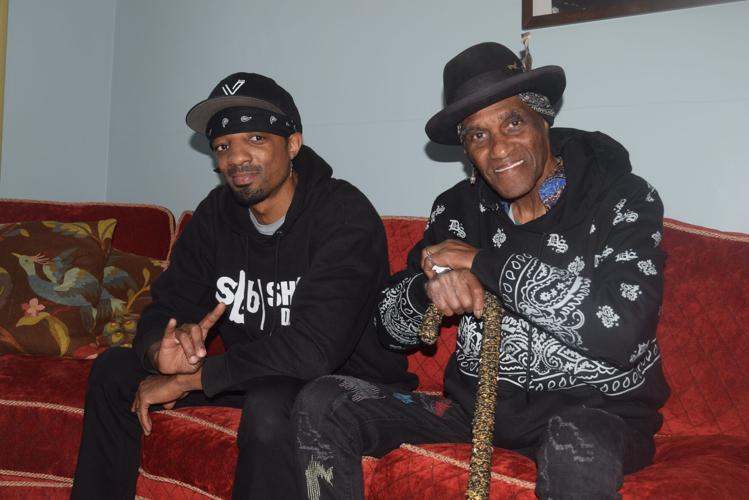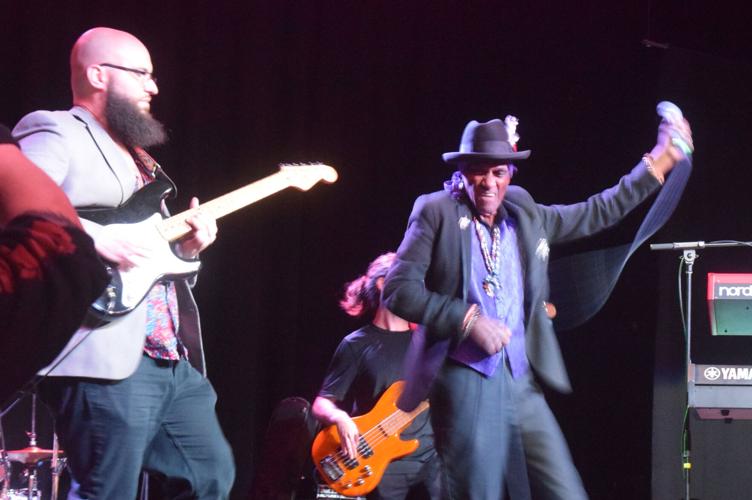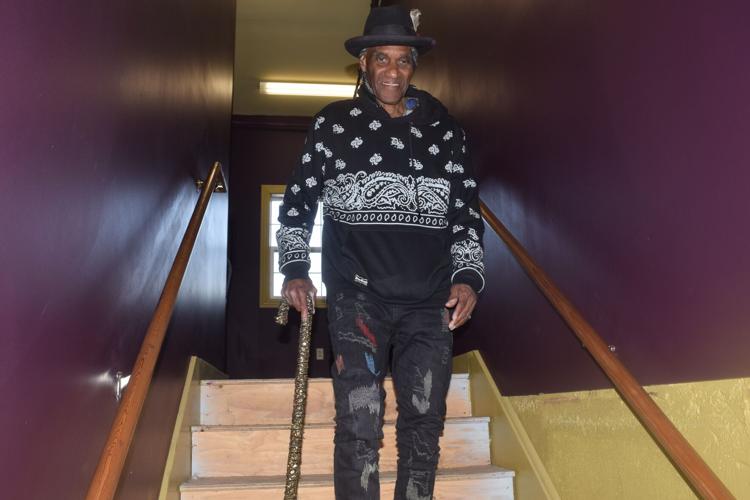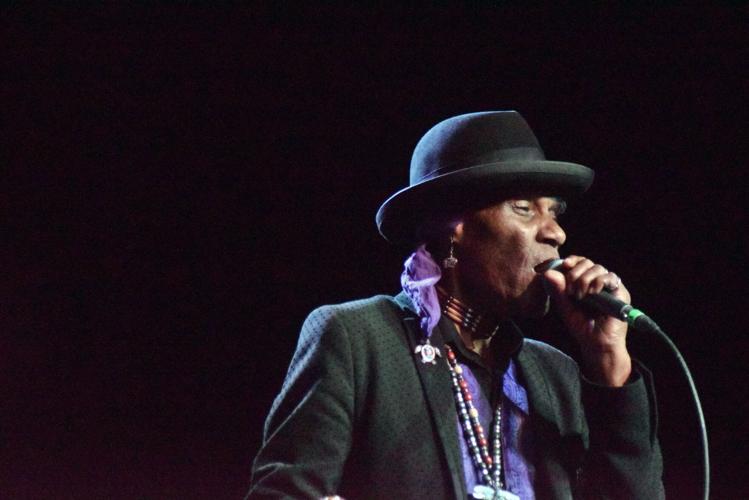It has always been about family for Cyril Neville, the youngest brother with a last name synonymous with New Orleans music. Now the man known as The Uptown Ruler has joined forces with the next generation of Nevilles, continuing what his family has been working on for decades.
Neville has been on tour with his son’s band, Omari Neville and The Fuel, and last week made a stop at Plymouth's Flying Monkey Movie House & Performance Center, playing a mix of classics from his days with legendary funk group The Meters, as well as brand-new material.
“I told you we’d be getting funky at the Monkey,” Neville said to a pumped up crowd on Oct. 2.
Neville is a musical force — once a percussionist for the iconic bands The Meters and The Neville Brothers — and now a lead singer, dancing up a storm with mic in hand while Omari Neville sets the groove on the drum kit.
“We’ve been planning this since he was about 4,” Neville told the crowd, flashing a big smile.
Before the show, Neville sat down to talk about his storied career. He admitted it was a little weird to talk about himself, and in the same breath said he's one of the luckiest people alive, always playing with the best musicians around.
Neville started playing drums when he was just a kid, growing up in a family of musicians, well before his brother, Art, formed The Meters.
“I am the artist formerly known as the youngest Neville,” he said with a grin. “The fact that my brother Art, Papa Funk, had a band that used to rehearse in my living room that always consisted of the cream of the crop of local musicians. So, it was never a question to me about what I was going to do. Growing up in New Orleans during the ‘50s and ‘60s, this is when New Orleans music set the pace of what the rest of the country was going to do.”
He was inspired by a who’s who of Louisiana musicians playing and practicing around him all the time. They would teach him “all kinds of different shuffles and rumblers” on the drums, and while some would question why there was some rookie being thrown into the mix, someone would say, “He’s a Neville.”
“They’d say, ‘Oh, you’re a Neville? Then, you’re all right,’” Neville said.
Neville said everything we know as popular music has its origin in New Orleans. People talked about Chicago and Memphis, but he said the blues went up the Mississippi from New Orleans, not the other way around.
“James Brown is where I first heard who said New Orleans is the home of the blues,” Neville said. “And it stuck with me. So, in every style of music that could ever be thought of has been played, and is presently being played, in New Orleans.”
While the Nevilles are all household names there, performing was in his family long before that. Both his parents were singers, and Neville’s mother and uncle were part of a dance team so good they had offers to take the show to New York.
That plan was shot down by his grandmother, much to their dismay, with Neville saying she saw the contract and “pulled the hot poker out of the fireplace and chased the people out of the house.”
His mother vowed to the children they’d never get in the way of their musical journey, and the brothers certainly held her to it.
“Music was a part of everything in our lives, and my family wasn’t the only musical family in the neighborhood,” Neville said. “It was like that in every neighborhood in the city.”
Neville has since won a pair of Grammy awards, and his percussion and vocals brought a whole new element to The Meters when Art recruited him in 1974. They toured with The Rolling Stones and are widely known as pioneers of the New Orleans funk sound.
That alone is a resume to be reckoned with, but he's still having just as much fun onstage as ever.
“Music is everywhere,” Neville said. “The tugboats on the Mississippi River have a certain rhythm. Street cars have a certain rhythm. One time, in the early ‘70s, there was a lot of construction going on, and they were using these steam hammers. If you ride through the city, you hear that coming from different directions. So, if you’ve got rhythm inside of you, you pick up on that and feel that. This is really a musical city in every sense of the word.”
Neville said by the time he was 16, he had already met some of the top musicians, like Allen Toussaint and James Booker. They were coming by the house to play with his brothers, and was a big part of how he decided he would never get painted into a musical corner.
Neville recalled the days of a segregated city, and said he puts a lot of these references into song.
“My brother, Art, early on, took me a lot of places with him, and a lot of times we were the only two, quote-end quote, ‘colored’ people in the place,” Neville said. “That kind of showed me a lot about who he was, and how the world outside our house saw him. This was a time when there was blatant segregation. There was no place in this country more segregated than New Orleans. To a certain extent it is still like that. One thing that couldn’t be contained or denied was the music.”
He noted it was illegal for white and Black musicians to even play on the same stage in The Big Easy until 1970. But music transcended that. It didn’t stop artists from finding a way to interact and play with each other.
“There’s a story about Dr. John getting arrested at the Dew Drop,” Neville said. “And as they put him in the car, he said they better be back again next week, because Ray Charles is going to be here. That’s how stupid racism is. It’s really, to me, a mental illness. It really put a microscope on the psychodynamics of abnormal behavior.”
Neville grew up during the Civil Rights movement, in an interesting part of the country for such a time. He speaks about New Orleans in an endearing way, but also tells the grisly truth of what it was like to break through barriers, stereotypes and bigotry.
“I knew early on that music is medicine,” Neville said. “It is a spiritual force that heals. I’ve witnessed it. And to be onstage, sharing my gift with thousands of people, and having those people send energy back. When the realization hits you that you are a catalyst of this, that’s a beautiful feeling."
Now years later, he has lived the dream of making music his life, and successfully at that. While he was once the young one in the bunch, now he has the opportunity at 76 years old to help his son, Omari Neville, continue the family legacy, while evolving his own sound and outlook on music.
“As the passing down goes, sometimes things get passed up,” Neville said. “I am learning from them now. That is the beauty of being able to travel with my son, and the guys he has been playing music with since their early teens.
“I feel very lucky and blessed.”





















(0) comments
Welcome to the discussion.
Log In
Keep it Clean. Please avoid obscene, vulgar, lewd, racist or sexually-oriented language.
PLEASE TURN OFF YOUR CAPS LOCK.
Don't Threaten. Threats of harming another person will not be tolerated.
Be Truthful. Don't knowingly lie about anyone or anything.
Be Nice. No racism, sexism or any sort of -ism that is degrading to another person.
Be Proactive. Use the 'Report' link on each comment to let us know of abusive posts.
Share with Us. We'd love to hear eyewitness accounts, the history behind an article.